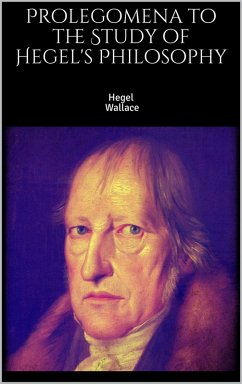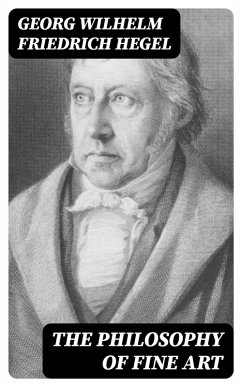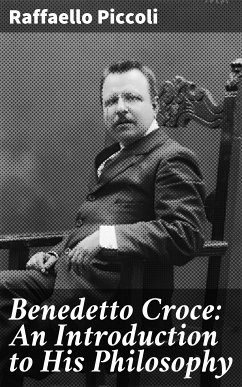
The Introduction to Hegel's Philosophy of Fine Arts (eBook, ePUB)
Enriched edition. Translated from the German with Notes and Prefatory Essay
Kommentar: Blackwood, Nigel / Redaktion: Good Press / Übersetzer: Bosanquet, Bernard

PAYBACK Punkte
0 °P sammeln!
In "The Introduction to Hegel's Philosophy of Fine Arts," Georg Wilhelm Friedrich Hegel offers a profound examination of the nature and significance of art within the broader spectrum of human experience and development. Written in an intricate and often challenging style, Hegel employs dialectical reasoning to explore how artistic expression embodies cultural and historical consciousness. The work is situated within Hegel's larger philosophical framework, where he scrutinizes the evolution of art forms and their role in the unfolding of absolute spirit, ultimately revealing the ethical dimens...
In "The Introduction to Hegel's Philosophy of Fine Arts," Georg Wilhelm Friedrich Hegel offers a profound examination of the nature and significance of art within the broader spectrum of human experience and development. Written in an intricate and often challenging style, Hegel employs dialectical reasoning to explore how artistic expression embodies cultural and historical consciousness. The work is situated within Hegel's larger philosophical framework, where he scrutinizes the evolution of art forms and their role in the unfolding of absolute spirit, ultimately revealing the ethical dimensions and societal functions of artistic creation. Hegel, a central figure in German Idealism, was deeply influenced by the turbulent socio-political landscapes of his time, including the aftermath of the French Revolution. His academic background in philosophy, history, and aesthetics informed his belief that art serves as a crucial mediator between the individual and the collective, mirroring the zeitgeist of its era. Hegel's rich intellectual tradition and personal experiences shaped his reflections on art as a manifestation of freedom and self-awareness. This book is essential for anyone seeking to understand the philosophical underpinnings of art and aesthetics. Hegel's insights resonate in contemporary discussions about the role of art in society, making this work not only a cornerstone of philosophical literature but also a vital resource for artists, philosophers, and cultural critics alike. In this enriched edition, we have carefully created added value for your reading experience: - A succinct Introduction situates the work's timeless appeal and themes. - The Synopsis outlines the central plot, highlighting key developments without spoiling critical twists. - A detailed Historical Context immerses you in the era's events and influences that shaped the writing. - An Author Biography reveals milestones in the author's life, illuminating the personal insights behind the text. - A thorough Analysis dissects symbols, motifs, and character arcs to unearth underlying meanings. - Reflection questions prompt you to engage personally with the work's messages, connecting them to modern life. - Hand-picked Memorable Quotes shine a spotlight on moments of literary brilliance. - Interactive footnotes clarify unusual references, historical allusions, and archaic phrases for an effortless, more informed read.
Dieser Download kann aus rechtlichen Gründen nur mit Rechnungsadresse in A, B, BG, CY, CZ, D, DK, EW, E, FIN, F, GR, H, IRL, I, LT, L, LR, M, NL, PL, P, R, S, SLO, SK ausgeliefert werden.













